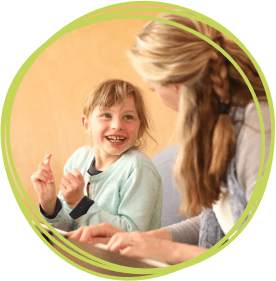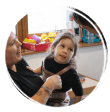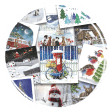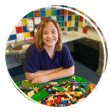
Tell us about your job working in care? What’s your typical day/week
I have the privilege of being the Lead Music Therapist for CHSW. I relocated in September 2013 to set up the CHSW Music Therapy service. Before this, I was the Music Therapist at Helen House in Oxford for 15 years. Helen House was the first children’s hospice.
There is no ‘typical’ day here and my role is very varied! I work 28 hours per week and much of my time is spent offering clinical Music Therapy sessions to babies, children, young people, and siblings who are staying with us. I also offer home visits to children and young people who are unable to attend school.
Music plays a huge part in all our lives. There is rarely a big life event that doesn't have music at the centre of it. Music can express so much of what we are feeling, and this is where the concept of Music Therapy is born.
Music Therapy at CHSW offers a space in which babies, children and young people can communicate and express themselves, both verbally and non-verbally, through vocalisation, body language, and facial expressions.
The baby, child or young person is at the heart of every session, and my role is to respond to them, mainly through improvisation; with singing and a range of musical instruments, such as, drums, keyboards, guitar and percussion instruments. I also use music technology as a tool for self-expression. Music can be a great leveller, thanks to the advances in technology which allow a child with little movement to create some of the loudest sounds and ‘outplay’ their siblings!
Some children find that music relaxes them, others can be energised by it. They may choose to make up a song about how they are feeling, others will simply sit quietly in the therapeutic space, where there is no expectation to perform or do anything other than ‘just be.’
The sessions can be tailored to the individual needs of each baby, child or young person. We also enjoy many family-based music sessions where we explore the sights, sounds, textures, and vibrations of different places. We have a story bag that simulates going to the beach, amongst others.
I work closely with the Siblings Team, offering sessions with siblings so they can enjoy one to one time with another service provider.
Music Therapy can offer a space in which they can ‘offload’, talk, play, and express their feelings. We enjoy making music and singing along to their favourite pop group or learning a riff on the guitar.
Part of my role involves supporting our 2 other Music Therapists, who are based at Charlton Farm and St Austell. I also have close links with the Fundraising Team and offer talks and presentations as and when requested to give potential or current supporters an insight into our work.
What do you enjoy most about working at CHSW and/or in care/nursing?
I think that the most powerful part of my work is the knowledge that I can focus on what a child can do in music rather than what they can’t do.
In my Music Therapy sessions, there will often be a baby, child or young person who makes a huge effort just to coordinate their hand to reach out and play the windchimes. This may seem like a very small thing to the casual observer, but it is a huge achievement and something the parents are delighted to hear about and see photos and videos of their efforts.
What motivated you to apply to your role?
I had been working as a Music Therapist for 15 years both at Helen House and on the wards of Oxford Children’s Hospital.
When the opportunity came for me to move to North Devon to set up the Music Therapy service I jumped at the chance. This opportunity allowed me to hone my skills within my new role and to live in one of the most beautiful parts of the country.
How did you become a Music Therapist? What job were you doing before?
Since a very young age when I sang in my local village church choir, I have always been touched by the capacity for music to affect us on every level. From those early days when the hymns and anthems chosen for particular days of the year would really help the congregation to worship, through to my days when I began to teach the oboe and piano and wanted to learn more from the students about how the music they were playing made them feel. I have always wanted to support people’s emotions through music or enable them to express themselves in the music.
What would you say are the skills you need to do your job? Have you learnt any new skills since being in post?
I have an acronym that helps me to focus in my work, and I feel it is a good mantra both at work and home… the acronym is O-P-E-N
O – Observe carefully. Try and understand what the person before you is saying and feeling…
P – Be Patient – don’t try and rush the relationship; rather, allow it to unfold naturally and organically…
E – Engage fully – put your phone away, be fully present and put all other thoughts to one side…
N – Nurture the relationship; follow through with conversations and try and help the person to feel valued and heard.
If you could do another job within CHSW for the day, what would it be?
Ooh gosh that’s a hard one as I really can’t think of anything else I would rather do!
I think I’d like to try my hand at trying to cook for 30 people – I love baking, but a roast for 30 is a very daunting prospect, so maybe I’d learn a thing or 2 about how to do it well! The Sunday roasts here are legendary!
How does it feel to be a part of the CHSW family?
Being part of a team is key for me to feel fulfilled in my work. The Care Team here are phenomenal and supportive. We support one another and listen to each other.
I am lucky that I forge close relationships with other departments, such as; Fundraising, Admin, IT, these are all vital areas of expertise and without these people I wouldn’t be doing this amazing work.
Tell us anything else you love about your role/CHSW...
2 things I love about my role are:
- Music can get to the heart of things so much more quickly than words.
- Music can bring great joy and fun into the house. Babies, children, young people and staff are often involved in making up hilarious stories about dinosaurs or dragons, or even making some interesting noises and sound effects into a microphone!
I feel so privileged to be entrusted with this work. For me, this is not a job, it is a vocation, and I am incredibly fortunate to hold this position.
What attracted you to a role in CHSW/care/nursing?
The old adage ‘making a difference’ is true for me. In my Music Therapy sessions, I can focus on what a child can do, and I can offer photographs and videos of their child in music as memories for the family in years to come.
What do you enjoy most about your role?
Music can reflect and express every emotion; joy, humour, love, peace, sorrow, pain, grief. There isn’t an emotion that music can’t address.
Music is a great leveller too. It can empower children by offering them a platform to express something of who they are, to create their own music-story and for it to be recorded and heard by others.
What inspires you in your working life?
I take my inspiration from the children themselves: their determination to live life to the full.
What are the best things about being part of CHSW and/or the Care Team?
Mutual support, understanding that we all have different but equally important roles to play. The clinical care setting alongside the therapeutic input that I offer.









